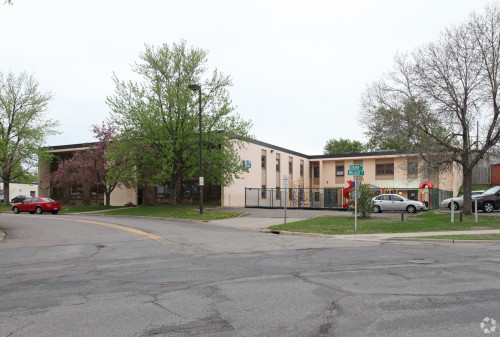

Fellowship Recovery St. Louis Park
Treatment Focus
This center treats substance use disorders and mental health conditions. You'll receive individualized care catered to your unique situation and diagnosis, learn practical skills for recovery, and make new connections in a restorative environment.
Primary Level of Care
Outpatient treatment offers flexible therapeutic and medical care without the need to stay overnight in a hospital or inpatient facility. Some centers offer intensive outpatient program (IOP), which falls between inpatient care and traditional outpatient service.
This provider hasn't verified their profile's information. Are you the owner of this center? Claim your listing to better manage your presence on Recovery.com.
Treatment Focus
This center treats substance use disorders and mental health conditions. You'll receive individualized care catered to your unique situation and diagnosis, learn practical skills for recovery, and make new connections in a restorative environment.
Primary Level of Care
Outpatient treatment offers flexible therapeutic and medical care without the need to stay overnight in a hospital or inpatient facility. Some centers offer intensive outpatient program (IOP), which falls between inpatient care and traditional outpatient service.
Insurance Accepted
This center accepts insurance, exact cost can vary depending on your plan and deductible.
Fellowship Recovery St. Louis Park
Fellowship Recovery St. Louis Park
About Fellowship Recovery St. Louis Park
Outpatient Support for Addiction and Mental Health
Fellowship Recovery offers outpatient treatment for adults facing substance use and co-occurring mental health disorders. Their programs align with ASAM Level 1 (Outpatient) and Level 2.1 (Intensive Outpatient), providing structured care while allowing clients to live at home and maintain daily responsibilities. Group sessions are held from 9 a.m. to 12 p.m., with an additional evening option from 6 to 9 p.m. at their Minneapolis site.
Locations Dedicated to Clients' Needs
Fellowship Recovery's Minneapolis location primarily serves single adults, justice-involved individuals, and those with medical cannabis prescriptions. It's located near the Midtown Greenway and major bus routes, offering easy access for those in South Minneapolis and nearby neighborhoods.
The St. Louis Park location serves parents with children and offers daytime programming that fits family schedules. It sits in a quieter, residential area near parks and schools, providing a more family-centered environment.
Both locations are in walkable neighborhoods with public transportation access, and telehealth options are available to support ongoing care.
Evidence-Based and Holistic Therapies
Fellowship Recovery uses evidence-based therapies like cognitive behavioral therapy (CBT) and dialectical behavior therapy (DBT), with holistic methods that support long-term recovery. Treatment includes individual and group therapy, with sessions focused on trauma, emotional regulation, and family dynamics. Their team also provides mental health counseling to help clients build resilience and better manage co-occurring conditions.
Extra Support for Real-Life Challenges
Clients have access to 12-step facilitation, medication-assisted treatment (MAT) for opioid and alcohol use disorders, and licensed mental health therapy. Fellowship Recovery also offers case management services to help with housing, employment, and legal issues.
Center Overview
Treatment Focus
This center treats substance use disorders and mental health conditions. You'll receive individualized care catered to your unique situation and diagnosis, learn practical skills for recovery, and make new connections in a restorative environment.

Insurance Accepted
Cash Pay Rates
Estimated Cash Pay Rate
Center pricing can vary based on program and length of stay. Contact the center for more information. Recovery.com strives for price transparency so you can make an informed decision.
Levels of Care








Your Care Options
Specializations
Alcohol
Using alcohol as a coping mechanism, or drinking excessively throughout the week, signals an alcohol use disorder.
Drug Addiction
Drug addiction is the excessive and repetitive use of substances, despite harmful consequences to a person's life, health, and relationships.
Licensed Primary Mental Health
Some primary care providers offer mental health diagnosis and treatment. This can prevent patients from developing more serious conditions.
Who We Treat
Men and Women
Men and women attend treatment for addiction in a co-ed setting, going to therapy groups together to share experiences, struggles, and successes.
Approaches
Evidence-Based
A combination of scientifically rooted therapies and treatments make up evidence-based care, defined by their measured and proven results.
Individual Treatment
Individual care meets the needs of each patient, using personalized treatment to provide them the most relevant care and greatest chance of success.
Twelve Step
Incorporating spirituality, community, and responsibility, 12-Step philosophies prioritize the guidance of a Higher Power and a continuation of 12-Step practices.
Therapies
1-on-1 Counseling
Patient and therapist meet 1-on-1 to work through difficult emotions and behavioral challenges in a personal, private setting.
Medication-Assisted Treatment
Combined with behavioral therapy, prescribed medications can enhance treatment by relieving withdrawal symptoms and focus patients on their recovery.
Motivational Interviewing and Enhancement Therapy (MET)
This approach is based on idea that motivation to change comes from within. Providers use a conversational framework that may help you commit to recovery.
Twelve Step Facilitation
12-Step groups offer a framework for addiction recovery. Members commit to a higher power, recognize their issues, and support each other in the healing process.
Conditions We Treat
Anxiety
Anxiety is a common mental health condition that can include excessive worry, panic attacks, physical tension, and increased blood pressure.
Depression
Symptoms of depression may include fatigue, a sense of numbness, and loss of interest in activities. This condition can range from mild to severe.
Substances We Treat
Alcohol
Using alcohol as a coping mechanism, or drinking excessively throughout the week, signals an alcohol use disorder.
Co-Occurring Disorders
A person with multiple mental health diagnoses, such as addiction and depression, has co-occurring disorders also called dual diagnosis.
Drug Addiction
Drug addiction is the excessive and repetitive use of substances, despite harmful consequences to a person's life, health, and relationships.
Opioids
Opioids produce pain-relief and euphoria, which can lead to addiction. This class of drugs includes prescribed medication and the illegal drug heroin.
Languages
Aftercare






